Photos by Photographer York Wilson
Nearly 400 community leaders, advocates, social work practitioners, faculty, students and others gathered in person and virtually on April 3, 2023, for UNC School of Social Work’s 2nd Annual Legacy Speakers Series. This year’s daylong event focused on Advancing Equity and Transforming Mental Health and Substance Use Disorder Systems through Social Work Advocacy, Research, and Workforce Development.
The speakers series, which Dean Ramona Denby-Brinson developed and launched last year, offers the School, the campus community and others the opportunity to consider the progress that has been made in addressing grand social problems, such as child maltreatment and family trauma, and to think about the challenges that remain, Denby-Brinson noted in her welcome to series participants.
“We’re taking on difficult conversations, but we’re grappling with those issues together,” she said. “We’re looking at them from the lens of science and practice and policy and that’s on purpose. That’s by design because we don’t think any one person has a solution. The solution doesn’t lie in academia. It’s going to take all of us collectively to solve these problems.”
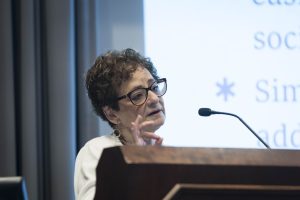
Much of the day-long event revolved around panel discussions on issues such as behavioral health workforce development; policy practice and advocacy to transform North Carolina’s behavioral health system; advancing equity in substance use disorder treatment and recovery; and meeting the behavioral health needs of LGBTQIA+ individuals. In addition, Clinical Associate Professor Laurie Selz Campbell presented on social work’s complicated legacy in behavioral health, including the profession’s support of eugenic sterilization up until the mid-1970s.
Highlighting this year’s series was keynote speaker Professor Michelle Munson of New York University’s Silver School of Social Work. Munson’s research focuses on psychosocial interventions and services for youth and young adults living with serious mental health conditions and their loved ones. In her presentation “Social Work and Mental Health: Can We Learn from the Past to Inform Our Future?” Munson delved into the behavioral and mental health crisis facing the nation’s children and youth, an issue that has grown alarmingly worse since the Covid-19 pandemic.
According to some of the most recent statistics released from the U.S. Surgeon General, 5 million of the nation’s total 26 million youth have experienced a major depressive episode. Further, one in three high school students and half of female students reported persistent feelings of sadness or hopelessness in 2019, an overall increase of 40% from 2009. At the same time, research has also shown that about 40% of parents are extremely or very worried that their children will struggle with anxiety or depression at some point in their lives.
“So, it’s important to point out that mental health impacts everyone in some way, but for a subset of our people and youth, it impairs their way of life,” Munson noted. We also know that less than half of these young people receive treatment that can help them manage these challenges.”
Although historically, research and practice have largely focused on interventions that target individual problems, Munson said solutions around youth mental health are expanding with a broader focus on transdiagnostic treatments because so many young people today have complex multiple diagnoses.
“We’re really trying to understand the common experience of trauma in people’s lives because regardless of diagnosis, so many of our youngsters are (emotionally) dysregulated and that crosses diagnostic pictures,” she said.
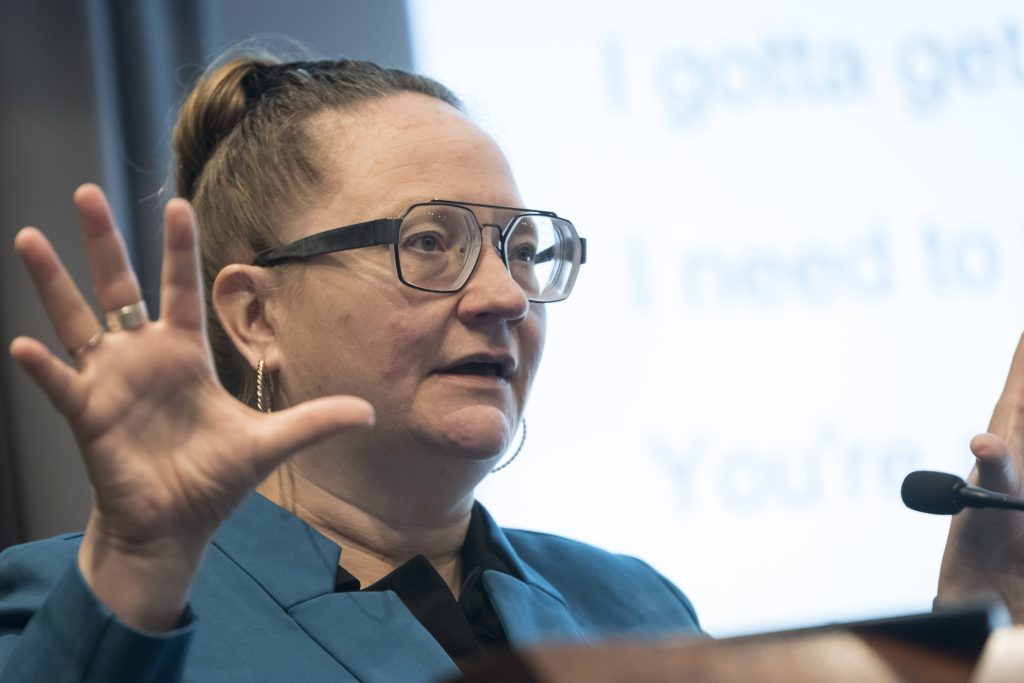
For Munson and her colleagues, focusing on the conditions and relationships that shape young adults’ decisions to seek or not seek professional mental health services has been central to their research over the last several years. Using community engaged studies that invite and center the experiences and perspectives of youth and families, she and her colleagues have been working to strengthen the quality and perceptions of the mental health system so that as youth transition to adulthood, they are more likely to seek professional care when they need support.
“One of the main factors that came up as a barrier for a lot of the young people we were talking to was a lack of trust in the system— in the psychiatric system and in other systems because these young people were involved in multiple systems of care during childhood,” Munson said. “Probably not so surprisingly, they also had issues around internalized stigma and the public messages they were receiving around what does it mean to be mentally ill.”
Much of her work today still focuses largely on listening to youth about what they want and need from mental health providers and ideas for getting young people to invest in their own mental health, she said. Through the use of innovative strategies that involve music and the visual arts, researchers are helping youth to think about the role they play in decisions around their own treatments, Munson said. Moreover, she and her team have learned the importance of making services fun and engaging and the value of youth hearing directly from other youth about their own positive experiences with mental health.
At the same time, researchers also continue to look for ways to bring behavioral and mental health programs into community spaces where youth and families often gather.
“These community-based organizations are often places where families and children enjoy activities and programs, and there’s trusted providers there,” Munson added. “In having conversations with those places, perhaps we could build capacity there and bring programs there to prevent psychiatric crises from happening.”
Panel Discussions
 A New Legacy for Behavioral Health Workforce Development
A New Legacy for Behavioral Health Workforce Development
Moderator: Sarah Reives-Houston, Director, Behavioral Health Springboard, UNC School of Social Work
Panelists:
- Bernice K. Adjabeng, Program Director, NC Certified Peer Support Specialist (NCCPSS) Program, Behavioral Health Springboard, UNC School of Social Work
- Felicia Gibson, Center for Child and Family Health
- Brianna Lombardi, Research Assistant Professor, UNC School of Social Work
- Flo Stein-Bolton, Chair, North Carolina Addictions Specialist Professional Practice Board
Highlights:
- In past 20 years, the percentage of people who have mental health needs and receive services has remained at around 50%
- Does the narrative that the nation is facing a shortage of behavioral health care workers detract from a focus on redesigning the system?
- Access to behavioral health care is more complicated than the availability of services — the conversation must also include accessibility, accommodation, acceptability, and affordability.
- When Peer Support is done well, there are decreased costs to the mental health system, decreased hospitalizations, increased social functioning, and increased empowerment and hope.
- A strong behavioral health workforce should look like the communities they serve.
 Policy Practice and Advocacy to Transform North Carolina’s Behavioral Health System
Policy Practice and Advocacy to Transform North Carolina’s Behavioral Health System
Moderator: Amy Wilson, Associate Professor, UNC School of Social Work
Panelists:
- Valerie Arendt, Executive Director, National Association of Social Workers-North Carolina
- Sydney Batch, North Carolina General Assembly
- Joonu Coste, Attorney, Disability Rights North Carolina
- Lisa Nesbitt, Attorney, Disability Rights North Carolina
Highlights:
- The mental health system is the most fractured system within North Carolina. There is no continuity of information or care among the regional authorities responsible for managing and coordinating the provision of mental health services.
- 61 of the 100 counties in North Carolina do not have a psychiatrist.
- Increasing Medicaid reimbursement rates for behavioral health care would help alleviate provider shortage and ensure more people have access to needed mental health treatment.
- 24% of the state’s prison population has a serious mental illness; 67% has a substance use disorder. To lower prison recidivism rates, the state’s correctional and judicial systems need to invest more money in educational and mental health treatment programs and in drug treatment courts that could divert people from the prison pipeline.
- The state could decrease the number of children in foster care if families were fully supported with wrap-around services when children are in crisis. Children removed from homes are less likely to be reunited with their families.
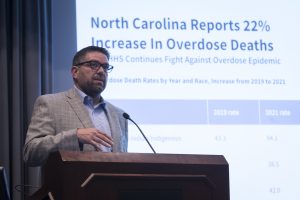 Advancing Equity in Substance Use Disorder Treatment and Recovery
Advancing Equity in Substance Use Disorder Treatment and Recovery
Moderator: Trenette Clark Goings, Professor, UNC School of Social Work
Panelists:
- Melissa Godwin, Clinical Associate Professor, UNC School of Social Work
- Paul Lanier, Associate Professor, UNC School of Social Work
- Orrin Ware, Assistant Professor, UNC School of Social Work
- Courtni Wright, Peer Support Specialist, Healing Transitions
Highlights:
- Should substance use disorders be viewed from a moral perspective, which involves broad state-level differences, or as a disease/medical condition for which someone should be helped?
- Racial segregation predicts differences in access to medication-assisted treatment for opioid use disorders.
- More attention is given to infants exposed to opioids who may have withdrawal symptoms vs the attention given to long-term symptoms of infants with alcohol exposure.
- There continues to be a significant stigma around the medication used in opioid use disorder treatments.
- Trained social workers can help break the stigma around opioid use disorder and work proactively on prevention, especially among children.
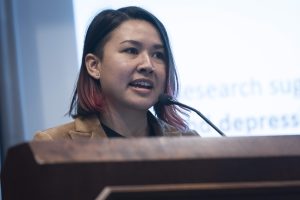 Meeting the Behavioral Health Needs of LGBTQIA+ Individuals
Meeting the Behavioral Health Needs of LGBTQIA+ Individuals
Moderator: Hayden Dawes, Doctoral Student and Graduate Research Assistant, UNC School of Social Work
Panelists:
- Dicky Baruah, Doctoral Student and Graduate Research Assistant, UNC School of Social Work
- Will Hall, Associate Professor, UNC School of Social Work
- Ankur Srivastava, Assistant Professor, UNC School of Social Work
- Denise Yookong Williams, Doctoral Student and Graduate Research Assistant, UNC School of Social Work
Highlights:
- Everyone experiences typical life stressors, but the LGBTQIA+ community faces an additional burden of minority-specific stressors related to their sexuality.
- Internalized sexual identity and gender identity stigma can manifest as negative attitudes and beliefs about queer identities, relationships and communities. As a result, clinicians need to consider if they are asking the right questions.
- Sexual identity is mutable and evolving, particularly during adolescence. Identity fluidity may be stressful for some adolescents; evidence suggests stress can lead to negative mental health outcomes.
- Queer people of color (POC) experience distinct stressors that differ from non-queer POC and White queer counterparts due to overlapping systems of oppression. Behavioral health systems have largely neglected queer POC.
- In India, transgender women, known as Hijras, are recognized as a third gender deserving of equal rights.
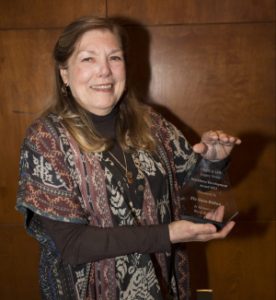 This year’s Legacy Speakers Series also honored the following individuals for their commitment to social work advocacy, research and workforce development. The awards were presented in memory of the late Worth Bolton, former director of the School of Social Work’s Certificate Program in Substance Abuse Studies, who died in 2019.
This year’s Legacy Speakers Series also honored the following individuals for their commitment to social work advocacy, research and workforce development. The awards were presented in memory of the late Worth Bolton, former director of the School of Social Work’s Certificate Program in Substance Abuse Studies, who died in 2019.
- Flo Stein-Bolton (Bolton’s wife), Workforce Development Award
- Michelle Munson, Research Impact Award
- Sen. Sydney Batch, Advocacy Award
The 2023 speakers series was envisioned and largely organized by Associate Professor Paul Lanier and Behavioral Health Springboard (BHS) Director Sarah Reives-Houston, with help from BHS staffer Jameceia Holliday. For nearly 20 years, BHS has served as a trusted bridge between research, practice, and education. BHS is a key resource and training hub for meeting the behavioral health needs of North Carolina’s communities.

